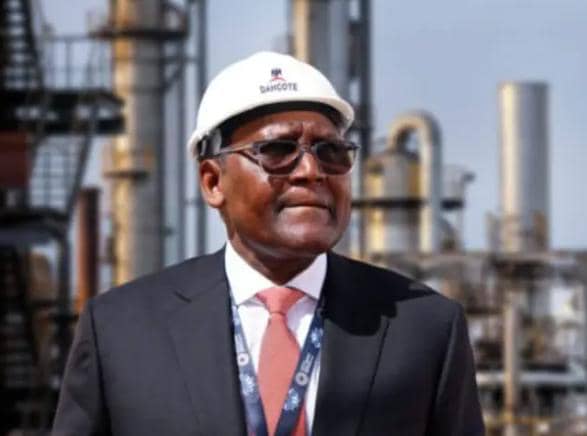The United States of America, Spain, France, South Korea, Angola, Togo, Guinea, Belgium, Israel, and Singapore, have been listed as the top 10 importers of petroleum products from Nigeria’s $20 billion Dangote Refinery.
This is even as students across tertiary institutions in the country under the aegis of the National Association of Nigerian Students, NANS, have passed a vote of confidence on the Dangote Refinery.
However, the products that have been shipped to the countries at different times include fuel oil, gasoline, jet fuel and Naphtha, thus attracting additional foreign exchange to the nation.
In its presentation – Nigeria’s Dangote Refinery – What it Means for Trade Flows and Price Benchmarks, at a recent virtual event, obtained by Vanguard, Argus Group, United Kingdom, disclosed that the refinery has changed the direction of petroleum products trade flows between West Africa and other regions while creating many multiplier effects, including jobs.
Nigeria’s fuel importation to drop 60% to 160,000 bpd
It noted that as a result of the coming onstream of the refinery, Nigeria’s petrol importation has been projected to drop by 60 per cent to the equivalent of 160,000 barrels per day, b/d by 2025, from 400,000 b/d in 2023.
The forecast has it that Nigeria would need to import only 75,000 b/d in 2025 compared to 350,000 b/d in 2023, adding that from 2026, it will start to import more following the expected population growth and rising domestic demand.
Nigeria to export diesel, jet-kerosine from 2025
According to Argus Group, the nation is also expected to start exporting diesel and aviation fuel from 2025, thus enhancing the inflow of additional foreign exchange into Nigeria.
It stated: “After years of anticipation, Nigeria’s 650,000 b/d Dangote refinery has been ramping up operations since the start of 2024, including loading regular refined product cargoes.
“The scale of the refining operation, in a region that has produced a lot of crude historically but refined little of it, will change global product trade flows and require new price benchmarking solutions for the West African market.
”Nigeria will go from an almost 400,000 b/d net import (short) position in 2023 to 160,000 b/d net export (long) position in 2025.
“Gasoline remains short, but the country will need to import just 75,000 b/d in 2025 compared to 350,000 b/d in 2023. From 2026 onwards net gasoline short however will start growing again and by 2040 it is forecast to be 220,000 b/d.
“Diesel flips from short to long, with the country able to export 130,000 b/d in 2025, and maintaining exports of above 100,000 b/d throughout the forecast period. Jet-kerosine surplus of around 20,000 – 30,000 b/d for most of the forecast period. But overall, by 2035, due to forecast strong demand growth, Nigeria’s total net export position is eroded, and by 2040, is 120,000 b/d net short.”
The organization harped on the need for continuous investment in the midstream and downstream sectors, adding “West Africa’s net import position more than halves in 2025 but net short grows again from 2026 onwards and out to 2040.
”But the net import position will start rising again as soon as 2026, and then steadily increase out to 2040 at 1 million b/d, with gasoline 500,000 b/d short, diesel 300,000 b/d and jet 100,000 b/d. Dangote refinery timeline.”
Vanguard











Leave a Reply